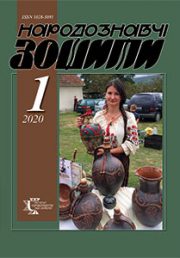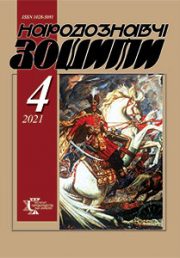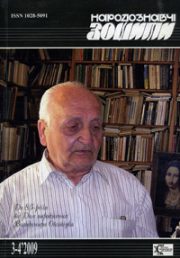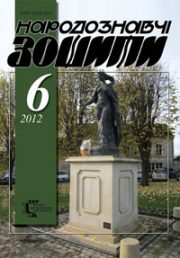The Ethnology Notebooks. 2020. № 5 (155), 1175—1188
UDK 130.2+2:1+316.74
DOI https://doi.org/10.15407/nz2020.05.1175
PROBLEMS OF FAITH, RELIGION AND ATHEISM IN THE WORKS OF ALEXY SELIVATCHOV (1887—1919)
GAVRYLYUK Alla
- ORCID ID: https://orcid.org/0000-0002-6833-6462
- Postgraduate student,
- Kiev National University of Culture and Arts,
- 36, Yevhen Konovalets Street, Kyiv, Ukraine,
- Contacts: e-mail: alla_stepp@ukr.net
Abstract. Relevance and objectives of the article: Alexy Selivatchov, cultural historian, philologist and philosopher, died in Kharkov at the age of 32. His works remain little known, although are published since 1916 to the present day. They analyze interdisciplinary issues that still remain the focus of modern humanities. The purpose of the proposed study is to identify through the prism of a young Kharkiv researcher’ works the peculiarity of such a kinds of spiritual activities in the secular artistic culture of Central and Eastern Europe of the last two centuries, as a Search for God, Proselytism, God-fighting etcetera. The object is the literary heritage of a number of philosophers and artists, analyzed by A.F. Selivatchov. Among them are Georg Daumer, Fritz Mauthner, Vassily Rozanov, and a galaxy of symbolist poets — Balmont, Blok, Bryusov, Ivanov, Sologub. The subject of the article is the amplitude of spiritual pursuits, which ranged from pietism to the extreme manifestations of demonism, sometimes in the works of the same individuals. The sources and materials used are printed articles and manuscripts of A. Selivatchov preserved in the archive, publications of other authors dealing with the same issues. General scientific research methods were used, first of all textual, biographical, comparative, etc.
We conclude that mentioned scientists and artists are primarily absorbed in the search for truth and aesthetic perfection, so it is inappropriate to divide them into two alternative groups — believing idealists and materialist atheists. From the analysis and inferences of the author it follows that spirituality, despite scientific or poetic declarations, is manifested not only in the religious but also in the demonic dimension, which sometimes coincide. The same «ambivalence» (or a kind of pendulum) is observed in the attitude of these characters to certain beliefs and denominations.
Keywords: atheism, faith, demonism, creativity, religion, symbolists, silver age, Daumer, Mautner, Rozanov.
Received 19.10.2020
REFERENCES
- Selivatchov, A. (1995). Psychology of Judophilia.InV.V. Rozanov: Pro et contra (Book 2, pp. 223—239) [in Russian].
- Puchkov, A. (2003). Alexy Selivatchov. ANT: Bulletin of Archeology, Art, Cultural Anthropology (Issue 10—12, pp. 119—120). Kyiv [in Ukrainian].
- Puchkov, A. (2006). «By the way, think, can you help…»: Letters of M.O. Gershenzon and two philosophical treatises by Alexy Selivatchov (1912—1919). Modern problems of research, restoration and preservation of cultural heritage: Coll. Scient. Works (Issue 3, part 2, pp. 147—192). Kyiv: Ed. house A+C [in Russian and Ukrainian].
- Puczkow, A., & Marchenko, Ju. (2013). Alexy Seliwaczew — Michael Bakhtin’s teacher from Wilno. Znad Wilii (From over the Neris), 4 (56), 104—110 [in Polish].
- Selivaczow, M. (2016). Like a romantic lantern. Znad Wilii, 4 (68), 95—114 [in Polish].
- Puchkov, A., & Marchenko, Yu. (2016). Alexey Fedorovich Selivachev, teacher of Bakhtin in Wilna. Towards the formation of a domestic culturology. Nikonov readings. Topical issues of cultural studies and art history (Vol. I,pp. 259—264). Cheboksary [in Russian].
- Gavrylyuk, A. (2020) The role of a family tradition in the formation of a creative person (for example, five generations of Selivatchovs). The Ethnology Notebooks, 1, 177—189 [in Ukrainian].
- Artemieva, T.V., Mikeshin, M.I. (Eds.). (2001). History of ideas as a methodology of humanitarian research. Philosophical age. Almanac (Issue 17—18). St. Petersburg [in Russian].
- Lovejoy, Arthur. (2001). The great chain of being. History of the idea. Transl. from English edition of 1936. Moscow: House of intellectual books [in Russian].
- Marx, K., & Engels, F. (1964). Works: in 50 vol. (Vol. 7, pp. 208—213). Moscow [in Russian].
- Valentin, Veit. (1876). Daumer, Georg Friedrich. General German Biography (Vol. 4, pp. 771—775). Leipzig [in German].
- Birkenbihl, Michael. (1904). Georg Friedrich Daumer: Contributions to the history of his life and his west-east poetry. Munich [in German].
- Lopukhin, A.P. (1913). Biblical history (Vol. I, p. 54). St. Petersburg [in Russian].
- Selivatchov, A. (1916). Georg Friedrich Daumer. The story of one soul. Problems of Philosophy and Psycholog, 135, 329—355 [in Russian].
- Marx, K. (1927). About the «Secrets of Ancient Christianity». From a speech delivered in the «Society of Workers’ Education» in London on November 30, 1847. In: Daumer G. Secrets of Ancient Christianity (P. 1). Moscow [in Russian].
- Selivatchov, A. (1917). Psychology of Judophilia. Russian thought (Book 2, pp. 40—64) [in Russian].
- Mauthner, F. (1906). Contributions to a Critique of Language (Vol. I—III). Stuttgart; Berlin [in German].
- Selivatchov, A. (1916—1918). Fritz Mauthner. Manuscript with pagination from p. 33rd to 87th. Stored in the family archive. Kharkiv [in Russian].
- Mauthner, F. (1910—1915). Dictionary of Philosophy: New Contributions to a Critique of Language (Vol. 1—2). Munich; Leipzig [in German].
- Selivatchov, A. (1911). From modern Russian lyrics. Manuscript of the report (62 pages), delivered in the «Russian Academic Union» of Leipzig on February 9, 1911. Stored in the family archive [in Russian].
- Selivatchov, A. (1915). Vyacheslav Ivanov as a mystic. Report outline manuscript (6 pages), delivered at the Vilnius gymnasium O.R.S.O on Sunday, March 1, 1915. Stored in the family archive [in Russian].
- Selivatchov, A. (1918). On the teaching of language and literature in high school. The manuscript (25 pages), re-written by the author in Kharkiv on September 17, 1918. Stored in the family archive [in Russian].
- Selivatchov, A. Blok. Lecture outline manuscript (Pp. 1—4). Stored in the family archive [in Russian].
- Selivatchov, A. Sologub. Lecture outline manuscript (Pp. 1—4). Stored in the family archive [in Russian].
- Bіrd, Robert. (2011). Vyacheslav Ivanov abroad. Russian abroad: history and modernity (Issue 1, pp. 179—206) [in Russian].







